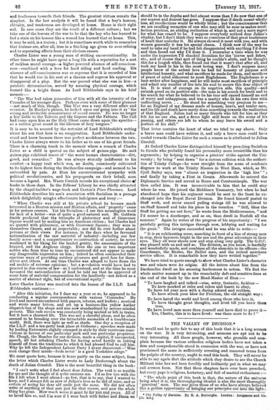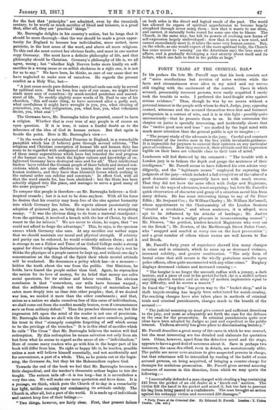THE VA T.T.F.Y OF DECISION.* IT would not be quite
fair to say of this book that it is a long sermon on the war. It is very interesting, and sermons are apt not to be very interesting. All those people, however, who grumble and com- plain because the various orthodox religious bodies have not taken a firm and comprehensible stand in connexion with the war, or have not proclaimed the same in sufficiently arresting and reasoned terms from the pulpits of the country, ought to read this book. They will never be able to say again that the attitude which they desire to see the Church Militant take has not been forcibly and brilliantly put in what we may call sermon form. Not that these chapters have ever been preached, but every page is religious, hortatory, and full of martial enthusiasm :- " The whole point of this book is that, the nature, of the universe being what it is, the thoroughgoing idealist is also the most thoroughly ' practical' man. The war gives those of us who have always believed this a golden opportunity of bringing our principles out into the light : • The Valley of Decision. By B. A. Burroughs. London: Longinses eind Co. [us. act.]
for the fact that ' principles ' are admitted, even by the twentieth century, to be worth so much sacrifice of blood and treasure, is a proof that, after all, they are ' practical' things."
Mr. Burroughs delights in his country's action, but he longs that it should be more thorough—that the war should be made a great oppor- tunity for England to become less individualist, more united, more patriotic, in the best sense of the word, and above all more religious. To this end she must correct her obvious faults, and must in one matter copy Germany. She must have a definite philosophy of life, and that philosophy should be Christian. Germany's philosophy of life is, we all agree, wrong ; but "whether high Heaven looks more kindly on self- sacrifice in a wrong cause or on selfish slackness in a right one, it is not for us to say." We have been, he thinks, so sure of our cause that we have neglected to make sure of ourselves. He regards the • present conflict as a Holy War, but- " A just cause needs pure defenders ; spiritual ends can only be served by spiritual men. Had we been less sure of our cause, we might have made more sure of ourselves—by much-needed penitence and amend- ment of life. To modify slightly some words of St. Paul to one of his churches, this self-same thing, to have sorrowed after a godly sort, what carefulness it might have wrought in you, yea, what clearing of yourselves, yea, what indignation, yea, what fear, yea, what vehement desire, yea, what zeal' 1 "
The Germans have, Mr. Burroughs takes for granted, ceased to have a religion. Whether that is ever true of any people is of course an open question. If it is true, it raises a fearful doubt as to the inherence of the idea of God in human nature. But that again is beside the point. Here is Mr. Burroughs's view:— "In the words of a naturalized Prussian in England, in a remarkable pamphlet which has (I believe) gone through several editions, The religious and Christian conception of human life and human duty has come to be regarded with undisguised contempt and as a survival of one of those many superstitions which have but retarded the real progress of the human race, but which the higher culture and knowledge of en- lightened Germany have destroyed once and for all.' Their intellectual leaders have robbed the German people of those -beliefs and inward con- victions which are alone effective in taming the natural and savage human instincts, and they have thus liberated forces which nothing in the natural order can subdue and constrain.' In effect God, with all that the word stands for, has been abolished : but the State has been adroitly slipped into His place, and manages to servo a good many of the same purposes."
To conquer this people is therefore—so Mr. Burroughs believes—a God- inspired crusade ; but it is not to be done anyhow. With all his force he desires that his country may keep free of the sins against humanity into which Germany has fallen. He regrets almost passionately our adoption of poisoned gas, as being done in imitation of a wrongdoing enemy. " It was the obvious thing to do from a material standpoint : from the spiritual, it involved a breach with the law of Christ, by direct resort to the lex falionia." We are never to claim, he urges, that " we could not afford to forgo the advantage." This, he says, is the specious excues which Germany also uses. At any sacrifice our author urges that we should maintain our moral and physical strength. If sobriety and purity can be enforced, he would evidently enforce them ; and it is strange to see a Fellow and Tutor of an Oxford College make a strong appeal for direct religions Sabbatarianism. Without one day's rest he thinks the physique of a people cannot be kept up, and without one day's concentration on the things of the Spirit their whole mental attitude will be weakened. He denounces a policy which has—in a measure— hidden the truth about the war from the public. Our Ministers, he holds, have feared the people rather than God. Again, he reproaches the nation for its love of money, for its belief that money can solve social questions, for its strikes and labour troubles. The obvious conclusion is that " somewhere, our wills have become warped ; that the selfishness (though not the brutality) of materialism has eaten more deeply into us than into other peoples ; that, if we desired war less, we needed it more than the other combatants ; and that, unless as a nation we shake ourselves free of this curse of individualism, we shall come out from the conflict morally beaten, even if circumstances save us from military defeat." Thus the preacher threatens us; but the impression left upon the mind of the reader is not one of pessimism. Mr. Burroughs thinks we shall win the war, and save ourselves, putting his trust in that " strangely complete forgetting of self which seems to be the privilege of the trenches." It is in this ideal of sacrifice which he calls "The Cross" that Mr. Burroughs believes the nation will find redemption. By this redemption he means salvation not only from sin but from what he seems to regard as the cause of sin—"individualism." Here of course many readers who go with him in the larger part of his book will differ from him. No right or happy life is, he teaches, possible unless a man will believe himself essentially, and not accidentally and for convenience, a part of a whole. This, as he points out at the begin- ning, the Germans do, but they let the Hohenzollern replace God.
Towards the end of the book we feel that Mr. Burroughs becomes a little rhapsodical, and the teacher's theocratic ardour begins to tire the taught. The sermon tails off—it is too long—but it is nevertheless a very fine one. We will make one more quotation and have done. It is a passage, we think, which puts the Church of to-day in a remarkably fair light, neither excusing nor condemning its attitude unduly. The Church is, after all, but a part of the world. It is made up of individuals and cannot keep free of their failings -- " Two things, however. are fairly clear. First, that present failure
on both sides is the direct and logical result of the past. The world has allowed its organs of spiritual apprehension to become largely atrophied through never using them : now that it wants to use them, and cannot, it naturally looks round for some one else to blame. The Church, in the same way, has left its powers of evolving new forms of self-expression largely undeveloped : now that it sees a new need, and cannot immediately meet it, it takes the same very human course. But, on the whole, as one would expect of the more spiritual body, the Church has come nearer to sensing ' (as the Americans say) the true state of affairs, and is gradually developing a vast anxiety about itself and its failure, which one fails to find in the public at large."



























 Previous page
Previous page